Commercial Accommodation In First Two Months Generates 581,000 More Overnights Y-O-Y
ZAGREB, 7 April 2022 - Croatia's commercial accommodation facilities saw 398,000 tourist arrivals and 1.1 million overnight stays in the first two months, which is 206,000 more arrivals and 581,000 more overnights compared with the same period of 2021, the national statistical office (DZS) said on Thursday.
In the first two months of 2022, domestic tourists generated 209,000 arrivals, or 54,000 more than in 2021, as well as 481,000 overnight stays, or 141,000 more year-on-year.
Foreign tourists generated 189,000 arrivals and 595,000 overnights stays in the first two months of 2022, which is an increase of 152,000 and 440,000 respectively.
The highest number of overnights was generated by tourists from Slovenia (17.7%), Germany (11.6%), Austria (10.7%), Italy (6.6%), the US (6.4%) and Bosnia and Herzegovina (6.4%).
The number of foreign tourists in commercial accommodation facilities surges by 468% in February
Compared to February 2021, this February alone 116.7% more tourists opted for commercial accommodation facilities or 225,500 of them, and they generated nearly 570,000 overnights or 132.5% more. Compared with February 2019, tourist arrivals dropped by 14.7%, while overnight stays went up by 3.7%.
There were 115,700 foreign tourists, or as many as 468.4% more than in February last year. They also generated 323.7% more overnights stays, or 334,400. Compared with February 2019, there were 32.1% fewer foreign tourist arrivals and 6.1% fewer overnights.
The most numerous were foreign guests from Slovenia, Austria, Germany, Italy, the US and Bosnia and Herzegovina.
For more, check out our business section.
Maritime Welfare in Croatia: Drvenik Case and What Law Says
June 25, 2021 - The issue of maritime welfare in Croatia was raised once again after a heated discussion on a beach in Drvenik Veli. Here are the details of the case and legal guidance to the maritime welfare in Croatia.
With the 2021 tourist season already being 58% better than 2020, tourists once again visit Croatia as one of the top holiday destinations.
However, like any year, the season can't go without at least some sort of incident.
Lovely beach, disgusting words
Yesterday, Croatia was shocked and enraged with the incident that happened on a beach on Drvenik Veli island (not so far from Trogir). Croatian journalist Tonka Alujević and her friend went to a beach where two Czech tourists started complaining that it's a private beach, perks of paying for a villa, and that Alujević needs to leave. Alujević refused to leave, stating that beaches are maritime welfare and cannot be privatized, refusing to move. After, as Alujević claims Czech tourists hit her head with a phone, they called the villa owner. 24 Sata daily newspaper published a video Alujević's friend recorded.
„Ma'ams, Ma'ams, how did you get here? On foot?“, asked the owner on a phone that was on speaker and held by the Czech tourists.
„I'm a journalist. Do you know Croatian laws? Do you want to end up in media?“ replied Alujević with a chill face while smoking a cigarette on a sunny day at the beach.
„Come on, put me in the media, come on put me! But first, go to the land register and see that my beach is private," screamed the owner in Croatian, with a lot of derogatory phrases (if only Czech tourists had a translator to understand the rich swear word heritage of Croatian language, right?)
The whole thing ended up with inspection stepping on the scene. Despite the video footage being clear, the owner, identified by Index.hr as Tomislav Meštrović, owner of Centovi Dvori Villa, tried to justify himself, saying everyone is welcomed at the beach, and he attacked the women because they passed through his doorway.
„No, I have no idea what video, who what... who knows what that is... I called the police for trespassing through my land“, said Meštrović to Index.hr when asked about the footage.
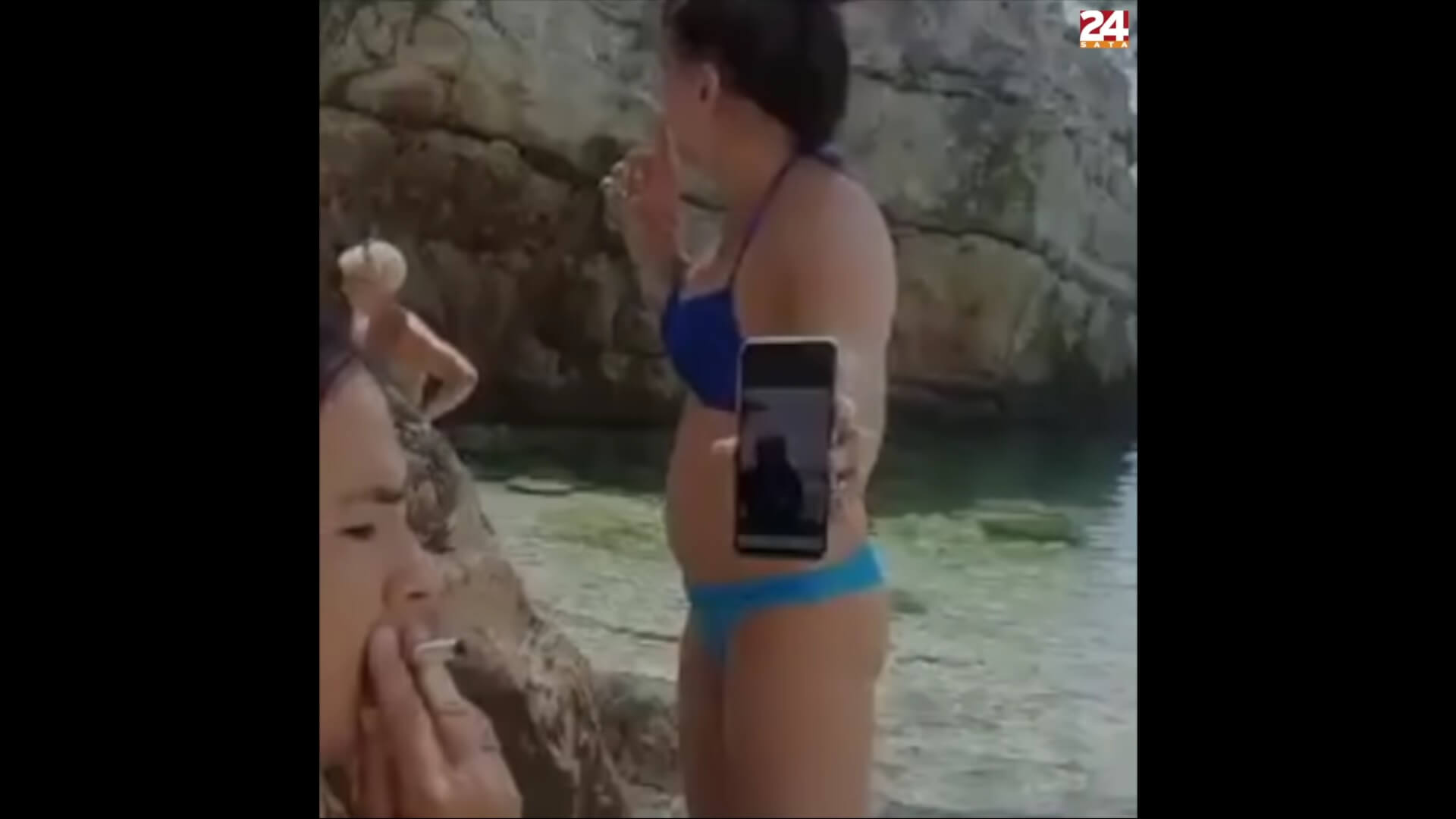
the conversation at the beach, screenshot/ 24sata
Law and order
Following this story, Index.hr's columnist Goran Vojković analyzed the law to clear up the issue of maritime welfare.
„The Maritime Welfare and Sea Ports Law states 'at least six meters from a line horizontally distant from the line middle waters'. But it can be wider, for example, if part of the land that in its nature or use serves to exploit the sea. It can also be narrowed- for instance, if support walls or a public road are close to the sea“, Vojković listed general rules but adding that maritime welfare border is specifically determined.
„So, the coast is free to use where the beach is, in general, six meters. You can come and use it for your needs, such as bathing, tanning, or walking. The land behind can be private, but the coast cannot“, concluded Vojković.
On the other hand, there are ways to limit the use of maritime welfare.
„There are some parts of the coast where you cannot enter. You can enter the marina and walk around it, but only until 10 pm. You cannot enter at all in a shipyard port. Those are the parts of maritime welfare for which the state assigned a concession to someone. The concession can limit or terminate public use“, explained Vojković.
Additionally, the law states that it is possible to have a beach in its concession and limit public entrance. But it needs to be registered, and the prices are so expensive that there are very few beaches like this in Croatia (Drvenik one not included in that small list).
„If someone claims that has a concession and that he/she can exclusively use some part of the coast, he needs to have a proof you can easily check in the register. I repeat, there are very small examples; even beaches in front of five-star hotels are public good“, Vojković pointed out.
And such beaches are filled with deck chairs, food stands, etc. But as Vojković pointed out, on a public beach, you have the right to bring your own deck chair, your own food, and drinks, and you can't be forced to consume content on the beach.
„In short, enjoy the Adriatic coast- with some very small exceptions of exclusive concessions, the entire coastline (including island coast) is free for your use and joy. Nobody can hold a grudge or complain if you came to a bath where they think it's 'their' beach. If someone is uncomfortable, don't debate, call authorities“, advises Vojković.
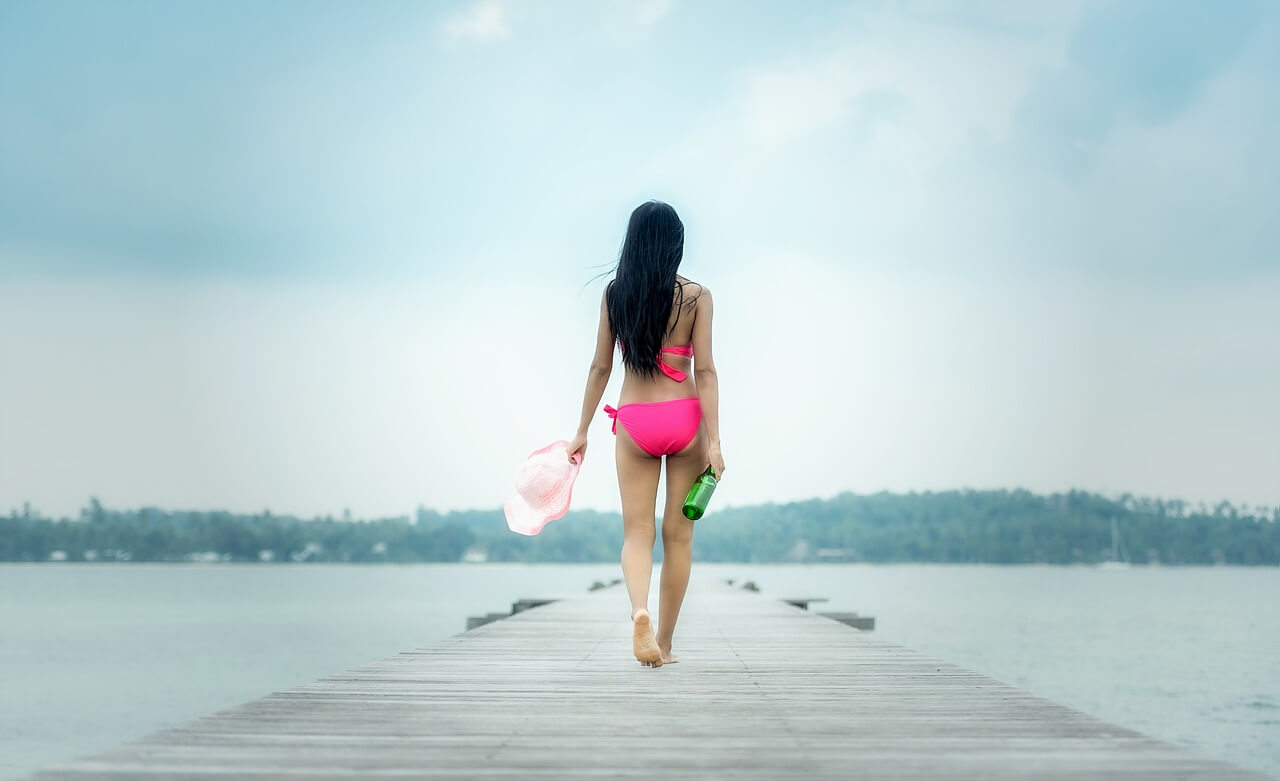
Pixabay
And the beach is open for public happily ever after
As Jutarnji List reported, the Drvenik case has a conclusion to an intriguing plot. Unhappy with Meštrović's behavior, Dalmatian locals went vigilantly and started writing bad reviews on Google, seeing the villa losing its value and tourists.
„Even though neither the building, nor its surroundings changed since the video was released, the unkindness of the owner was enough to move once-prestigious villa to the lowest grading Croatian places on Google“, says Jutarnji.
A couple of more lessons can be learned for a successful and enjoyable season from this tale.
For owners: present your offer fair in accordance with the law as transparency is the best way for your offer to beat the competition.
For tourists: if you were promised a private beach, but you see locals coming, don't be rude to them and don't attack them. The only one you can really be mad at is your host, who perhaps lied about what they can truly provide.
Learn more about beaches in Croatia on our TC page.
For more about travel in Croatia, follow TCN's dedicated page.
Where To Stay In Split (7): Off the Beaten Path
Staying in the heart of a 1,700 year-old city is unbeatable, and as we have already seen in this series, the vicinity of Split old town has many advantages when it comes to accommodation. One of the parts of Split we would like to recommend is the big area northeast of the old town. Those neighbourhoods are locally known as Lučac (pron. Lootchats), Manuš (Manoosh), Gripe (Greepae), and a little bit further are Bol and Dobri (Dawbry). This is for many reasons a very convenient place to stay: it's only minutes away from the old town and all important attractions. Beaches are also very close, and apartment prices are very competitive, real value for money. These neighbourhoods are early examples of urban Split, and staying there might give you a really good insight into the way of living in Split. Unlike the old town, or Varoš, or even Bačvice, there are many inhabitants still living in their apartments, meaning in these areas it's possible to experience some real life. That also brings some responsibilities for guests - respect your neighbours, they are there longer than you.
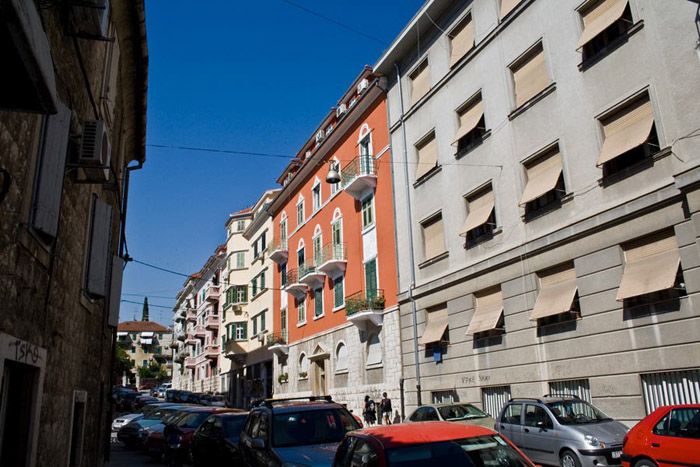
This area gives you several different moods, and living styles. Closer to Diocletian's Palace you can find narrow streets and old stone houses, very much like those in the old town or even more like in Varoš. This is the most vivid in a street called Radunica, and surrounding alleys, which are packed with apartments and rooms during summer. There are even a few hostels around.
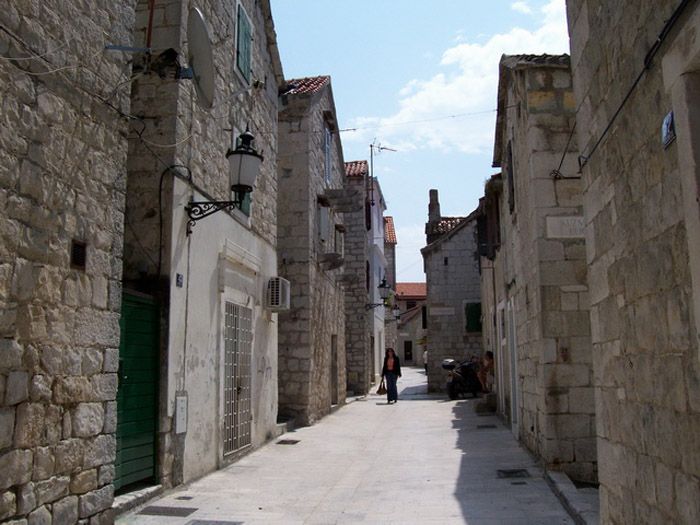
If you go further north and east bound, you will find nice quiet streets, but with bigger buildings. The further you go, the more Split changes its look, and becomes more modern. Nevertheless, it's still Split, with its unique atmosphere.
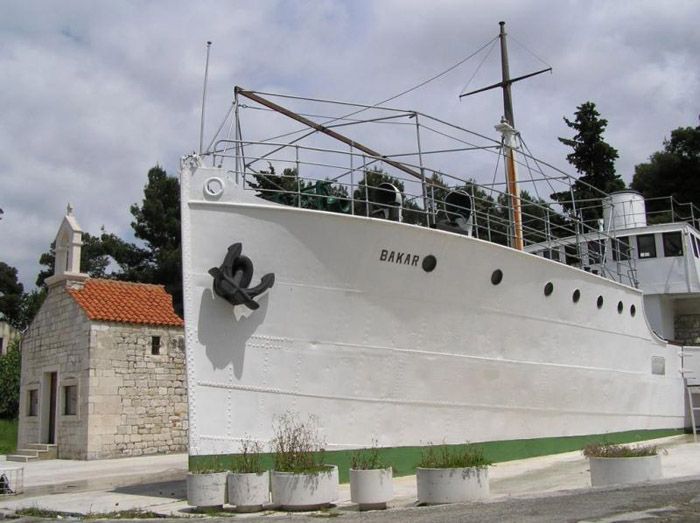
There are not so many attractions in this area, this is mainly residential. The biggest one by far is Gripe Fortress, with the Croatian Maritime Museum, including part of steam ship Bakar in its yard, which served as a convoy ship during WW2. If you are a basketball fan, very close to the fortress is the small sport arena, the home of Split basketball club, former Jugoplastika, which was named by FIBA as the best team in history. NBA players Toni Kukoč, Dino Radja, Žan Tabak, and many, many others are its legends.
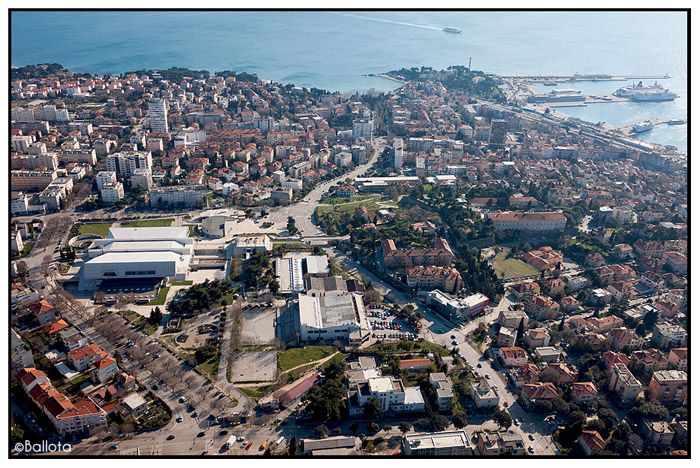
We have already said that accommodation in this part is easy to find, there are plenty of apartments. We typed in a random search for mid-June in AirBnB, and results are impressive, with some nice examples. However, there are not only apartments and rooms available, but also hostels, one of them was featured in Total Split, design hostel Emanuel.
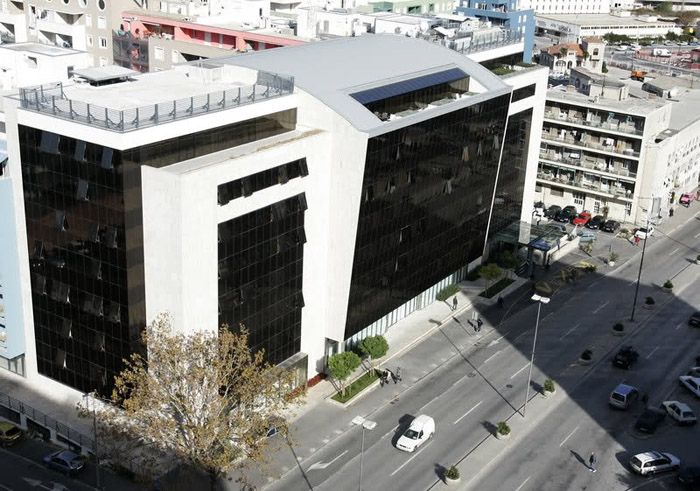
On the verge of these neighbourhoods, especially on its northwestern edges, there are several good hotels, with four or even five stars, like President, than Best Western Art Hotel based in former pastry factory. Also, the best rated is business oriented Atrium, and there is also more moderate, but excellently located Globo.
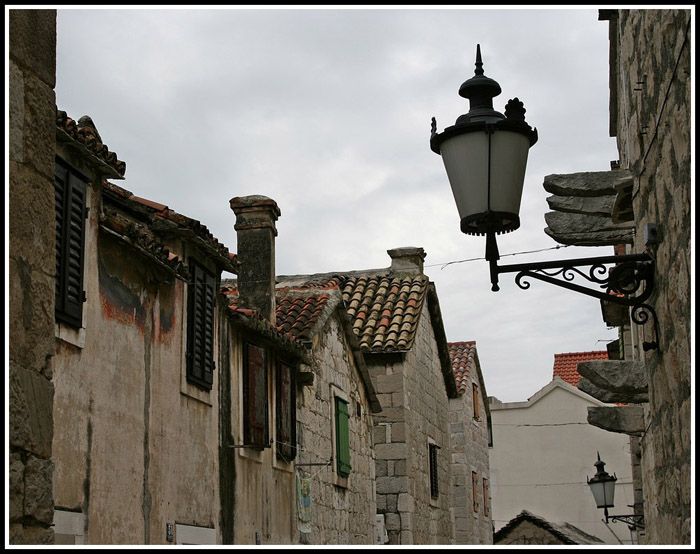
Being a residential area usually means there is almost no nightlife, and that goes with this area, too. There is a club called Masters within the sport center on Gripe, and that's pretty much it. The same goes for bars, and restaurants. Go to the old town for gastronomy or liquid pleasures. Still, it can be fun to drink where locals drink, at least morning coffee. People in Split are very loud, in small amounts it can be interesting to foreigners. There is, of course, one special place, Total Split's favorite pub in Split, and the oldest one, too - Basket.
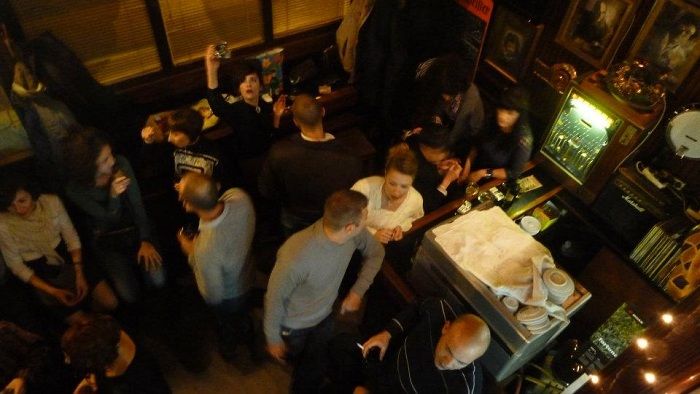
the downsides of this area, let's call it Split NE, are few. First, there is no tourist-oriented life (except accommodation), but that's not the big problem, especially for those who consider this as an upside. Also, this area has a problem with parking, like most of Split. There are paid parking lots closer to the Palace, but the rest is mostly left to your skills and luck. Not to mention that people who live there are also parked around. However, since it's so close to the old town, you can leave your car there and basically don't need to move it.
PREVIOUSLY IN WHERE TO STAY IN SPLIT
Choose Neighbourhood By Your Needs


